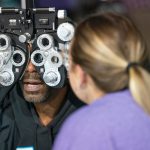Older adults are more likely to be managing a few different health issues at any given time, which means they often end up with prescriptions from multiple doctors, each treating a different disease. That can spell trouble if drugs interact.
In particular, psychotropic medications that act on the central nervous system, such as antianxiety or antidepressant medications, are especially dangerous if taken with opioids.
A study published recently in Pharmacotherapy by researchers at the University of Pittsburgh and University of Illinois at Chicago (UIC) found that 1 in 10 older dental patients who were prescribed opioids were already taking a counter-indicated medication.

Katie Suda, Pharm.D., M.S.
“Dentists are among the top prescribers of opioids,” said Dr. Katie Suda, professor of medicine at the Pitt School of Medicine and senior author on the paper. “It seems that the increased messaging regarding limiting opioid prescriptions has been aimed primarily at medical physicians and not tailored to other specialist providers, including dentists. This can have dire consequences. As we saw in our study, opioid interactions with other medications were likely responsible for the significant rise in emergency room visits and hospitalizations.”
Suda and her collaborators looked at medical, dental and pharmacy claims data from 40,800 older adult patients who visited a dentist between 2011 and 2015 and were prescribed opioids.
The average age of the patients included in the study was 69, and 45% were female. Of these patients, 10% were taking medications that are associated with increased risks for harm with opioid prescriptions.
The researchers found that patients inappropriately prescribed an opioid medication by their dentist were 23% more likely to be hospitalized or visit an emergency department in the weeks that follow compared to dental patients who were not prescribed an opioid medication.
“Some of the most concerning negative outcomes of these combinations include overdosing on opioids or falling, which can necessitate a visit to the hospital, which in itself carries greater risk for older adults,” said Dr. Gregory Calip, associate professor of pharmacy systems, outcomes and policy at the UIC College of Pharmacy and corresponding author on the paper.
Out of concern for opioid overprescribing, earlier this year Pitt Dental Medicine became the first in the nation to establish opioid-free prescribing guidelines.

Deborah Polk, Ph.D.
With the ultimate goal of helping doctors nationwide manage acute dental pain the Food and Drug Administration recently awarded a grant to Dr. Deborah Polk of Pitt Dental Medicine, and Dr. Alonso Carrasco Labra of the American Dental Association’s Science & Research Institute.
Polk and Labra will generate an evidence-based decision tree that doctors can reference when deciding on dental pain management strategies for their patients.
“Dental providers always strive to manage their patients’ acute dental pain as best as possible,” said Polk, who is an assistant professor of dental public health. “We hope the evidence-based guidelines we develop will help dentists provide their patients the most effective management of acute dental pain possible.”
Polk and Labra plan to do a limited roll-out of their guidelines in five states where there’s a lot of opioid prescribing and compare changes in how many opioid prescriptions are written, how many pills are written for and how strong a dose against those same metrics in the remaining parts of the country. If the new guidelines are working, the plan is to push them out nationwide.









